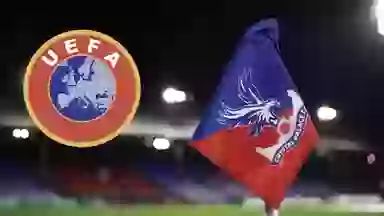UEFA’s stance on banning Crystal Palace from Europa League made clear as major update provided

Here’s a paraphrased and expanded version of the article to make it longer and more engaging:
UEFA’s Stance on Potential Crystal Palace Europa League Ban Revealed Amid Multi-Club Ownership Concerns
UEFA’s official response regarding the possibility of banning Crystal Palace from participating in the 2025/26 Europa League has come to light, providing much-needed clarity amidst weeks of uncertainty.
Crystal Palace made headlines in May after pulling off a historic upset by defeating Manchester City in the FA Cup final — a victory that not only secured their first major trophy in the club’s long history but also seemingly guaranteed them a coveted spot in next season’s Europa League. However, what should have been a moment of unfiltered celebration has since been clouded by complications stemming from UEFA’s strict rules on multi-club ownership.
Under existing UEFA regulations, two clubs with the same owner or owners deemed to exert “decisive influence” are not allowed to compete in the same European competition. This rule, designed to protect the integrity of continental tournaments, has put Palace’s Europa League place in jeopardy due to the club’s ownership structure.
The primary concern lies with American investor John Textor, who owns a significant share in Crystal Palace through Eagle Football Holdings, while also maintaining a controlling interest in French side Olympique Lyonnais. Lyon secured a sixth-place finish in Ligue 1, which also qualified them for the Europa League — thereby creating a direct conflict.
However, new reporting from Sky Sports chief correspondent Kaveh Solhekol has shed light on UEFA’s internal approach to the situation, revealing that the governing body is actively engaging with Palace to explore possible solutions. In a post shared on social media platform X, Solhekol stated:
“Crystal Palace are working closely and collaboratively with UEFA to end the uncertainty about their place in next season’s Europa League. Palace are in constant communication with UEFA in order to satisfy them that US businessman John Textor does not have decisive influence over the running of the club.”
UEFA is reportedly sympathetic to Palace’s situation, acknowledging both the extraordinary nature of their FA Cup triumph and the importance of preserving the competitive spirit of European football. According to Solhekol, the organization recognizes the symbolic value and sporting merit of Palace’s qualification, and is keen on finding a resolution that would allow them to participate.
“UEFA are believed to be sympathetic to Palace’s plight and are working with them to find a solution to the problem,” Solhekol added. “UEFA want domestic leagues and cups to be competitive and to keep the romance alive of a team like Palace winning the FA Cup and going on to play European football for the first time in their history.”
Further developments indicate that steps are already being taken behind the scenes to address ownership conflicts. Solhekol also revealed that John Textor is actively in talks to sell Eagle Football Holdings’ 43% stake in Crystal Palace. This move could be crucial in demonstrating that he no longer holds a controlling or influential position in the club, thereby aligning with UEFA’s compliance requirements. Textor himself directly owns an additional 30% of the club, but Palace’s legal team is reportedly working to demonstrate that he does not exert operational control.
Meanwhile, talkSPORT has added to the growing optimism around Palace’s situation. The outlet claims that the club is now widely expected to retain its Europa League spot, citing UEFA’s belief that Textor does not wield decisive influence over Palace’s sporting or executive decisions.
In summary, while the threat of disqualification initially cast a shadow over Palace’s historic achievement, UEFA’s latest stance appears to be one of cooperation rather than condemnation.
With ongoing negotiations and possible changes in ownership structure, the South London club looks increasingly likely to be granted their rightful place in next season’s Europa League — a reward for their unforgettable FA Cup journey and a momentous step into European football for the first time in their history.